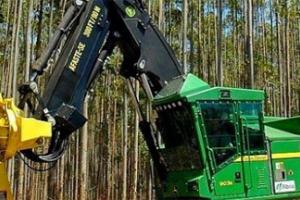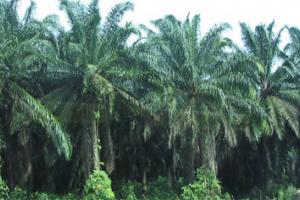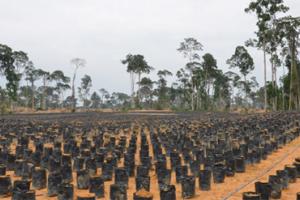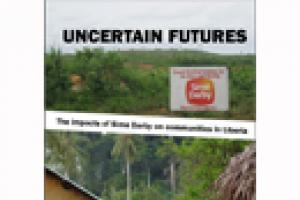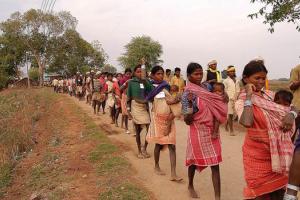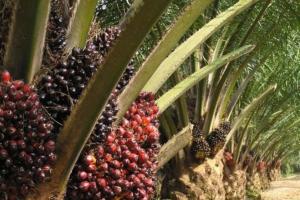The results of a research study carried out in different region, in 2010, by the Association of Forest Engineers for Native Forests were published last July. This Independent Forestry Monitoring led to a report on the environmental and social impacts caused by large scale tree plantations established by the company Anchile Ltda., and formal complaints were filed at the National Forestry Corporation (“Corporación Nacional Forestal” – CONAF), a body that is part of the Ministry of Agriculture.
Large-Scale Tree Plantations
Industrial tree plantations are large-scale, intensively managed, even-aged monocultures, involving vast areas of fertile land under the control of plantation companies. Management of plantations involves the use of huge amounts of water as well as agrochemicals—which harm humans, and plants and animals in the plantations and surrounding areas.
Bulletin articles
30 September 2012
Bulletin articles
30 September 2012
The Quebrada de los Cuervos canyon, located in the mountains of the Treinta y Tres District, was the first area to be registered as one of Uruguay's National Protected Areas (2008) for its rich landscape, its biodiversity and because it is representative of native ecosystems. Made up of grasslands, canyon bottom forests, gallery forests and creeks, this area is a biological corridor for a variety of species of flora and fauna.
Bulletin articles
30 September 2012
Today, speculative financial markets have gained increasing power over the economy and life, in a response to the capitalist crisis that began in the 1970s.
Action alerts
21 September 2012
Civil society organizations are denouncing the FSC certification of Fibria Celulose SA monoculture tree plantations by IMAFLORA, a Brazilian certification body. The organization’s demands are aimed at supporting the social and environmental battle carried out by the populations suffering the effects of cellulose plant projects, in this particular case, those by the firm Fibria (formerly Aracruz Celulose).
Other information
21 September 2012
ACTION ALERT - THE PHILIPPINES
The indigenous peoples (Higaonons) and peasants of Opol in Misamis Oriental in Southern Philippines are currently struggling against land grabbing resulting from a monoculture oil palm plantation, promoted by the A Brown Company, Inc (ABCI). Since the beginning of the plantation’s operations, Higaonons and other villagers have experienced severe human rights violations such as forced eviction, illegal arrest, strafing and harassment.
Other information
10 September 2012
ACTION ALERT - GABON
As many countries in Africa, Gabon is facing an alarming rate of expansion of oil palm and rubber plantations. The government has given the Singapore based company Olam 300,000 hectares of land to establish monoculture tree plantations.
Other information
30 August 2012
The Japanese paper-making company Oji Paper Group runs a paper mill in Nantong, East China, and had plans to build a pipeline for wastewater discharge from the mill. However, in July, thousands of residents in the neighbouring coastal city of Qidong took to the streets in protest amid growing concerns over the pollution the project would cause. They feared that wastewater containing contaminants and toxic matter would be dumped into the sea, polluting the area and killing the local fish stock. The pipeline would discharge around 150,000 tons of wastewater per day.
Other information
30 August 2012
Six Garifuna´s cooperatives that have recovered their land are facingat this moment the threat of paramilitaries who move around on motorcycles and 4x4 vehicles with heavy weapons and could massacre the Garifuna inhabitants who are resisting the dispossession of their ancestral territories.
Other information
30 August 2012
A Carbon Trade Watch report that links the demand for biomass in the UK, the role of the EU’s Emissions Trading System and the destructive expansion of industrial monoculture tree plantations around the world.
Publications
20 August 2012
By Silas Kpanan’Ayoung Siakor
Media Brief
Large-scale land grant to Sime Darby to grow oil palm in Liberia threatens the rights of local communities, their food security, and puts their wellbeing at risk.
Other information
30 July 2012
Land grabbing is characterized by the acquisition of vast areas of land in countries of Africa, Latin America and Asia for a variety of different uses, including large-scale monoculture plantations, mining, tourism, hydroelectric power plants and food production for export, among others, by companies, investment funds and financial markets in general (see WRM Bulletin Nº 177). This has wide implications on communities and their forests, livelihoods, traditional knowledge and indeed, on their present and their future.
Bulletin articles
30 July 2012
The Philippine A. Brown Company, Inc. is engaged in the business of oil palm plantation development and milling. In 2010, the company started planting oil palm on 520 hectares of public land claimed by the Higaonon indigenous people.

